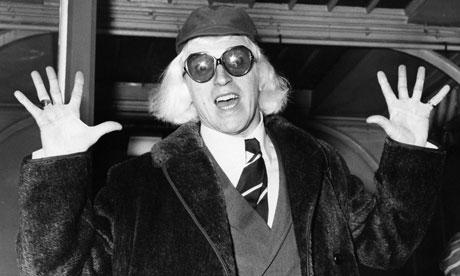Jimmy Savile: Why the Tabloids Were Unable to Publish and Be Damned
By Roy Greenslade
With the BBC taking a bashing from the tabloids over the Jimmy Savile affair, Michael White wonders why the "tough tabloids" themselves didn't nail the man. It's a fair question. After all, many people have said Savile's predilection for young girls was something of an open secret. Former Sunday Express editor Brian Hitchen admitted knowing about it 45 years ago. He was not alone. There were plenty of rumours. We all thought Savile was weird and probably up to no good. As White writes: "I always thought he was a dodgy bugger." But what about evidence as distinct from suspicion? Would any of it have been good enough as a defence should Savile have sued for libel? Paul Connew, when editor of the Sunday Mirror in 1994, did have "credible and convincing" evidence from two women who claimed Savile had been guilty of abusing them at a children's home. Though "totally and utterly convinced" they were telling the truth, the paper's lawyers, after a careful assessment, decided it wasn't strong enough to risk publication. (See postscript below). I am sure the same situation occurred elsewhere. There probably was enough prima facie evidence to mount an undercover operation. But finding a female reporter who would look young enough to lure him into an indiscretion would have been very doubtful. He would have spotted a tabloid sting a mile off. Of course, as White says, Savile was crafty. He chose his victims well – vulnerable teenage girls who were unlikely to report him and, if they did, were unlikely to be believed. After all, despite the weirdness, Savile was hugely popular, most obviously for his untiring work for charity. Did the beneficiaries of his fund-raising activities also turn a blind eye? And, on a similar track, note how speedily his family acted to remove the headstone from his grave "out of respect for public opinion". They didn't put up much of a fight to protect his reputation. Did they also have their suspicions about their famous relative? It is sobering to recall the public and press adulation at the time of his death. Look back at the Daily Mail coverage of his funeral, for example, Jimmy's grave with a view: Savile laid to rest in his golden coffin... at a 45 degree angle facing the ocean. The Sun's story about his death was headlined RIP Jimmy Savile: Prince Charles leads tributes as Jim'll Fix It star dies aged 84. The Daily Mirror obituary was adulatory too. And, yes, The Guardian carried only plaudits too, such as this one, which began: "He was a real dear; that's the word that comes to me. For all his oddities and the effects of life in the public eye, Sir Jimmy Savile was a lovely man." Now the police are investigating 120 lines of inquiry about his abuse of young girls. Charities are removing his name from their titles. And the BBC is under fire over its decision not to broadcast an investigation on Newsnight. The corporation has also taken some stick for not having done something about Savile during his days as one of its stars working at the television centre. Well, I think an inquiry is necessary over the Newsnight business (as I argue in my London Evening Standard column today). But it strikes me as a bit rich for newspapers to castigate the BBC for its earlier oversights. Was there ever proof? In truth, are we not all guilty in this matter? PS: Connew tells me that although he feels frustrated and somewhat guilty at failing to nail Savile 18 years ago, he did use the knowledge to good effect. He was consultant PR director for Sparks, the children's medical research charity, when a major corporate sponsor wanted to involve Savile. "I privately told the shocked managing director the score," says Connew, "and why we wouldn't be touching 'Saint Jimmy' with the proverbial bargepole."
|
.
Any original material on these pages is copyright © BishopAccountability.org 2004. Reproduce freely with attribution.
